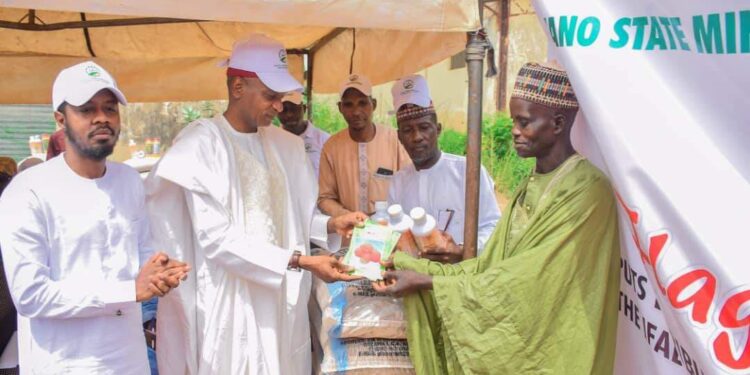About 1000 Rice and Tomato value chain farmers in Kano state North West Nigeria have received Agricultural inputs from the federal government under the Special Agro-Industrial Processing Zones, SAPZ Programme.
This is a federal government initiative for economic diversification and improved food Security.
According to the National Programme Coordinator Special Agro-Industrial Processing Zones SAPZ, Dr. Kabir Yusuf,
the programme is a pilot effort to strengthen Nigeria’s status as an attractive investment hub, particularly in agriculture.
Dr. Kabir Yusuf, emphasized that, the initiative aligns with the president’s agenda to bolster food security, foster job creation, and stimulate economic growth.
The Kano State Commissioner for Agriculture and Natural Resources, Dr. Danjuma Mahmoud, highlighted that the SAPZ Programme, supported by the Federal Government and the International Fund for Agricultural Development, IFAD, was aimed at improving Agricultural productivity by providing skilled farmers with essential resources.
Dr. Mahmoud called on the farmers to maximize the opportunity for optimal output.
“This initiative underscores the commitment to making agriculture a robust contributor to Kano’s—and Nigeria’s—economic landscape.”
Also Speaking, the State Project Coordinator, Alhaji Aminu Ilyasu expressed satisfaction with the project and thanked the National Coordinating team, and the funding bodies of SAPZ (IFAD/IsDB/ADB/FGN) for supporting SAPZ implementation in Kano State and the county at large.
He turged the farmers to continue to adopt to the Good Agronomic Practice skills they’ve acquired from the Project so as to realize high yield in their productions.
The beneficiaries expressed their satisfaction for the kind gesture and pledge to utilize the support wisely.
Jamila Abdulhamid and Ali, expressed gratitude for the support and guidance provided, noting the benefits of adopting Good Agronomic Practices (GAPs) in their cultivation processes.
It is expected that, the distribution which has been carried out in only 2 LGAs kura and Bagwai to rice and tomato value chain farmers as a pilot scheme, will later be extended to 16 LGA ‘s pending outcomes, experiences and lessons learnt.


Comments are closed.